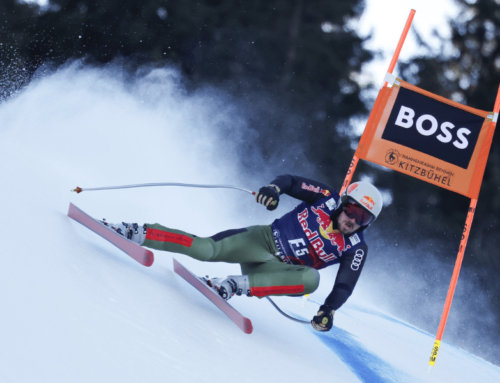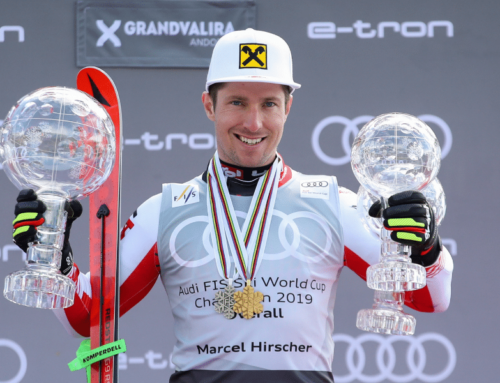HEAD CEO Eliasch vows sweeping change if elected FIS president
Editor’s note: This is the fourth in a series of articles featuring interviews with candidates for FIS president ahead of the June 4 election to replace Gian-Franco Kasper. In these articles, our goal is to provide an outlet for the candidates to state their platforms while we review the history and credentials of each. You can read our first three articles on Sarah Lewis here, Mats Årjes here, and Urs Lehmann here. Ski Racing Media has not endorsed a candidate at this time.
Having developed close relationships with numerous top ski racers as the chief executive officer of the HEAD sporting goods group, Johan Eliasch believes he is the right candidate to evoke necessary change at the International Ski Federation.
Swedish-born, but holding dual citizenship with the United Kingdom, Eliasch was nominated for the FIS presidency by GB Snowsport in March 2020. The 59-year-old billionaire businessman says it was not his intention to run for the ski federation’s leadership role until he was highly encouraged by “key insiders.”
“We are a fantastic sport, we are a lifestyle, we have so much potential, but we are a sleeping beauty,” Eliasch tells Ski Racing Media.
“I’m somebody with a lot of experience when it comes to turning companies around – you’ve seen that with HEAD. I see so much potential and I know that I can make it a success.”

Eliasch says the twice-postponed election has created time for him to cultivate stronger relationships with NSAs and, despite his business interests, he is motivated by passion for the sport. He says he is prepared to “start flying” on June 5, should he be elected.
“I have good relations with the vast majority of the NSAs. The past year I have spent a lot of time listening, I have traveled, met with people, got to understand and know their particular interests and what is important to them,” Eliasch says.
“I would say, as opposed to having a deficit, I have a surplus because I have invested one whole year and more into really getting to know what they want on the grassroots level and not just on the top level,” he said. “They all know what they would get if they vote for me.”
Starting the dialogue
In Part 1 of his manifesto, titled “Starting the dialogue” Eliasch emphasizes the importance of achieving the right balance between sports and entertainment. He provides specifics on how he believes the various FIS disciplines can be improved.
“For me, winter sport is so much more than alpine skiing in Central Europe,” Eliasch says. “Our focus should be on growing participation, recreationally and competitively, globally.”

A key ingredient to achieving his sustainable model is developing athlete, sponsor, broadcaster and viewer-friendly formats for the various disciplines.
Eliasch further breaks down his event-oriented model into:
- Rankings and divisions
- Minimize travel
- New locations
- Make the viewer experience more interactive
- Virtual advertising
- Content and streaming
- Night races
Eliasch provided questions to the NSAs further exploring potential event formats to “stimulate a dialogue on how we can make our competitions more entertaining and marketable.” He requested their advice and input.
“It is very important to point out that we are not just an office in Oberhofen with a few people; we are thousands of people around the world, 135 nations,” Eliasch stresses. “We need to get everybody embracing the same plan, moving in the same direction and then suddenly we become an incredibly powerful force.
“That is what I believe I am highly qualified in achieving. I can make a real difference.”
Continuing the dialogue
In the second part of his manifesto, “Continuing the dialogue,” Eliasch further specifies his plan with focus on the sport’s future and governance. It is categorized into:
- The future of our sport
- Investing in NSAs to enhance our future
- Maximizing potential
- Our smaller and developing ski nations
“We need to invest in our NSAs and help them thrive,” Eliasch proclaims. “We need to create level playing fields across the board when it comes to training opportunities, access, coaching development and move away from just alpine in Central Europe.”
In terms of improving FIS governance, Eliasch breaks down his plan and proposed restructuring into:
- Our governance
- Our council
- Expert advice
- Delegating powers
- Management and organization
- Environment, sustainability and resilience
- The art of winning is being prepared
“Governance is part of the ethos of moving everybody in the same direction,” Eliasch says. “It’s there to coordinate and get input.”
Eliasch proposes term limits for the FIS president, in addition to further change in other specified areas.
“I want a Council that is more interactive and it will benefit us to have an executive committee, which meets regularly. … It is important that everybody has a voice,” he says, referring to the “smaller nations.”
“We also need more diversity and that’s important to be more attractive across the board.”
Eliasch would like to see an advisory board with appointed experts and additional specialized committees.
“That is important so that people, our sponsors and stakeholders see we are an organization that is robust, transparent, gender diverse, diverse, open-minded and we’re going to make things happen.”
Targeting the North American market
Eliasch believes it is critical that skiing is more strategically marketed and better exposed worldwide with the lofty goal of achieving enhanced visibility similar to Formula 1 racing and professional golf and tennis.
He says focus on North America is the place to start.
“This is a huge opportunity – if you take the U.S. and Canada, there is a lot of interest in skiing, but no one has ever heard about FIS.
“They’ve heard about the X Games and with ski racing, maybe people watch during the Olympics and that’s it.”
Eliasch outlines his vision to implement change believing that television production of the sport should be enhanced with innovative telemetrics as seen during golf coverage in which a players’ club head speed, ball trajectory, distance and other data is provided.
“Those sort of things, if we have them, will make us more interactive with the viewers,” he says. He also notes that there needs to be live streaming of races via an app following the direction of other sports.
Eliasch says that schedule flexibility to provide greater visibility for North American races should be explored.
“We have to create awareness,” he says. “At the moment, we have a two-week block in North America out of five-and-a-half months, so we should see how we can extend that to benefit broadcasting, viewers and better engagement with our fanbase.”
Eliasch says procuring new North American sponsors should also be a target.
“We need to engage more sponsors and be more U.S.-focused,” he says. “We’re not, and this is something I’ve been complaining and harping about for the last 25 years. … The answer is always, ‘We’re looking into it.’ Now is the time to take action and do something about it.”
A candidate for change
Eliasch advises that if he is elected FIS president on June 4, he will immediately step down from his role as HEAD chief executive officer, a position that he has held since 1995.
He is one of four candidates vying for the FIS leadership role as the successor to Gian-Franco Kasper, who had led the federation for the past 23 years.
Eliasch’s opponents include fellow Swede and president of the Swedish NOC Mats Årjes, Swiss Ski Federation president and downhill world champion Urs Lehmann and former FIS secretary general Sarah Lewis.
He emphasizes his diverse credentials and varied experience in not only skiing and sports business, but also politics, foreign affairs, diplomacy and climate change.
Addressing the NSAs, Eliasch declared: “I have a vision and I can execute that vision. If you don’t want change, then I’m not your candidate. If you do want change, then I’m your choice.”





















